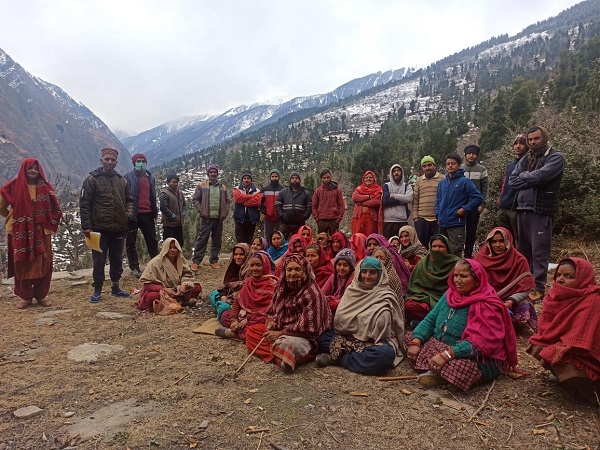Chamba, (Asian independent) In the run up to the Assembly polls in the BJP-ruled Himachal Pradesh, Prime Minister Narendra Modi will be formally inaugurating the 180 megawatts (MW) Bajoli Holi hydropower project on Thursday that has been facing dissent from the Gaddi community as they fear the project is posing threat to their houses and fields owing to cracks and seepage in private and public land.
They fear evacuation of their village, leaving behind their ancestral land and houses.
The locals, who grow apples and prized rajma (kidney beans) with traditional agriculture practices, besides raising livestock, have been demanding a geological survey.
“For the past 10 months we have been demanding a geological survey of the area that falls close to the pressure shaft of the project,” local resident Anoop Jhadota, a resident of Jharauta village, told IANS over phone.
Haunted by horrifying memories of the land sinking last December that damaged three village houses owing to high seepage from the dam, he said nearly 200 villagers have been living in constant fear of threat to life.
“Still people cannot sleep peacefully fearing what will happen to them if yet another disaster hit the village.”
Besides opening the Bajoli Holi hydropower project, Modi will be laying the foundation of two other hydropower projects, to be executed by state-run Himachal Pradesh Power Corp Ltd (HPPCL), and will address a public meeting at the famous Chowgan, or the public promenade in this historic town, to reiterate benefits of the adouble engine’ government for investment-led growth and delivery of social reforms.
Jhadota, who is a teacher in a government school, said the Bajoli Holi hydropower project is affecting the local ecology too with the axing of nearly 4,000 trees for its construction. Another 1,000 trees were damaged naturally in the December landslide. “For this the project authorities are to be held accountable.”
According to GE Renewable Energy’s Hydropower business, part of GE Power India Limited (GEPIL) that has commissioned the Bajoli Holi Project, three units of 60 MW each have been generating electricity since the project was connected to the grid in March 2022.
This power facility, which generates 94 per cent of energy required by the Delhi International Airport Ltd, has a head race tunnel of more than 16 km and has been constructed on the Ravi river.
The project is located some 70 km in Holi tehsil of Bharmour sub-division in Chamba, which ranks 95th in the Centre’s list of country’s 115 backward districts.
It faced a public outcry in March 2014 as Jharauta villagers demanding the shifting of the project. Twenty-five women were arrested on charges of forcibly stopping the project authorities to carry out construction activity.
At that they said the project had secured forest clearance from the Ministry of Environment and Forests without the consent of the local gram sabhas that was in violation of the Forest Rights Act of 2006.
The state had awarded the project to GMR Hydro Power on build-own-operate-transfer (BOOT) basis for 40 years from the date of commissioning. As per the initial timeline, it was be commissioned by January 2018.
A team of Himdhara, an environment action group that has been documenting the environmental impacts of mega development projects, had visited Jharauta village after the December landslide.
“Water was seeping from above and the land could be seen sliding down, stones rolling downaanother family vacated their house as the landslide kept growing,” said Vivek Negi, a member of the fact-finding team.
“Right where the seepage started first is the same area wherein 2014 women of the Holi panchayat organized a month-long sit-in,” Manshi Asher of Himdhara Collective told IANS.
“They were protesting the unscientific and fallacious shift in the tunnel site from the barren right bank to the forested and heavily populated left bank of the Ravi. People had warned the administration and authorities exactly of this, that the area had very fragile geology and there would be a tremendous threat to life and property but it all fell on deaf ears,” added Asher.
Anguish over the red-tapism, gram panchayat ward member Kavita Devi, 41, told IANS that despite so many representations, even to the Governor, no one seems concerned over threat of not only displacement but also to human and livestock lives.
“We have not been demanding individual compensation. We have been asking the government to provide benefits of rehabilitation and resettlement package under LADA (Local Area Development Authority),” she said, adding: “We are hopeful the Prime Minister during his visit will direct the project and local authorities to ensure public safety due to continuous water seepage and debris falling in the gram panchayat of Holi”.
In a latest missive to Chief Minister Jai Ram Thakur, Himdhara demanded a comprehensive scientific study for effective decision making and avoid life threatening near future hazards in the area. Also it sought the Himachal Pradesh State Dam Safety Organization intervention and investigation relating to safety of the 40-odd families.
The hills of Himachal Pradesh are alive with the sounds of villagers voicing their protest against the numerous hydropower projects that they say will further compromise their water and forest rights.
The upcoming projects will not only damage natural resources and affect livelihoods but also use up a considerable chunk of forest and agricultural land, argue locals and environment activists.








